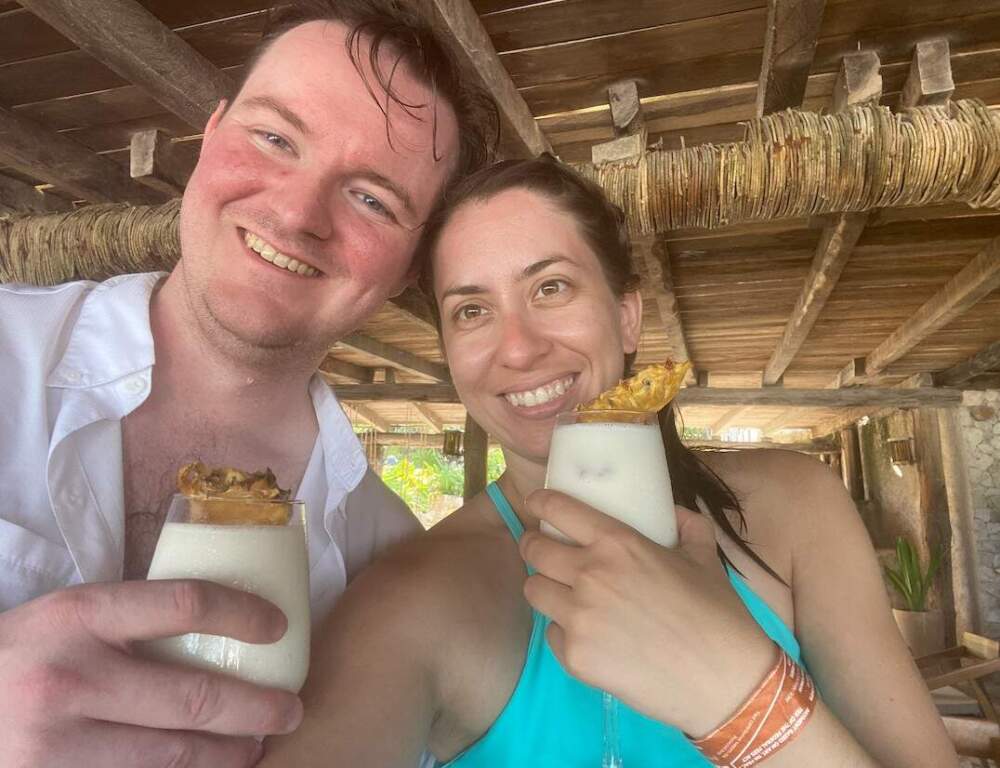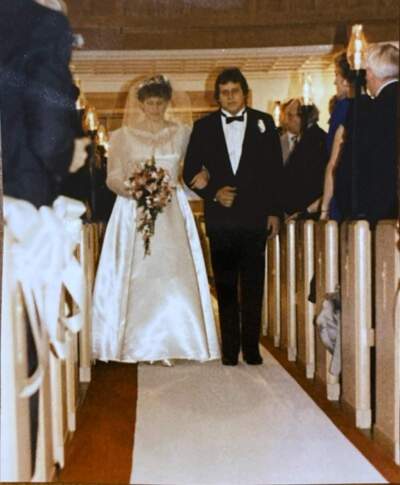Advertisement
Commentary
How we said 'no' to the wedding industrial complex

I am not engaged. But I am getting married this weekend. It came as a surprise to nearly everyone that we are getting married without a long engagement, diamond ring and elaborate proposal story.
But in January, while I was a graduate student living temporarily in Pittsburgh and my partner was at our home in Boston, we spent many nights staying up late talking on the phone. We knew marriage was part of our plan, but hadn’t decided how far into the future. During one of those long talks we wondered what it would be like to wed this year, when our family was in town for my graduation in May. The next day, I bought him a book called “What every bride needs to know” and added “and groom” in black Sharpie on the cover. We were in this together.
We set a modest budget and chose to pay for the event ourselves because we wanted to create a ceremony and celebration that aligned with our expectations — not other people’s. We also believe that a one-day celebration should not cost the same as a down payment on a home. (The cost of an average Massachusetts wedding is $42,000, according to The Knot, a wedding planning website. The national average is $35,000.) We made practical choices: I bought a wedding dress at a consignment shop, while my partner went with a custom suit that he’ll be able to wear for other events. But the wedding industrial complex, a $70 billion U.S. industry curating the “necessary” goods and services for weddings, kept increasing our costs. While we said "no" to a wedding party, flowers and a limo, there were still a few things that seemed non-negotiable, including a professional photographer, dinner for our guests and wedding bands.

Our nuptials won't meet everyone’s idea of a perfect wedding. But by saying no to some "extras" now, we hope to be able to say yes to buying a home and starting a family sooner rather than later.
I also wanted to avoid the traditional wedding culture I lived through in my 20s, when my life felt like a montage of romantic comedy scenes. As a college junior, I was the maid of honor who forgot to write her wedding toast. After my law school graduation, I was a bridesmaid in so many weddings it felt like a part-time job. There were color-coded spreadsheets and calendar invites for the wedding, but also for bridal showers, themed parties like “I do” BBQs, bachelorette parties, bridesmaids brunches and “come as you go” breakfasts the day after the wedding. What began as special and fun celebrations soon burned me out. It all felt like too much.
Watching close to two dozen friends plan their weddings showed me how demanding other people’s expectations and the Pinterest-wedding ideals are, and ultimately how it distracts from the underlying purpose of marriage: an act that conveys approximately 1,138 federal rights, protections and responsibilities, ranging from health care proxies to pension benefits. To keep our commitment to act in each other’s best interest, and not sweat the small things, my partner and I engraved “1138” in our wedding bands.

Finding an affordable place to get married has been the hardest part of our wedding planning. My mother and her mother were married in the same church in Maine, where they simply paid the organist and tipped the pastor. Since we were planning a spiritual — but not religious — wedding, we looked for secular spaces that offered beauty and meaning.
When we discovered the Boston Public Library offered one-hour ceremonies for $200, we were thrilled. The catch? They could only accommodate 12 people on a Monday. We took a good look at our guest list and ruthlessly scratched out one name after another during multiple rounds of edits. We were close to setting up a Zoom watch party across the street when we realized that taking a sledgehammer to our guest list was too painful. We kept looking.
I was disappointed that our options for affordable public spaces were so limited. The facility rental fee at deCordova Sculpture Park in Lincoln, for instance, starts at $11,000. That doesn’t include catering. On the more affordable end, the Boston Public Garden allows residents to be married for a $50 fee, but prohibits the use of chairs — my future husband’s 92-year-old grandmother be damned. We finally settled on a whiskey distillery that was willing to negotiate their rental cost in exchange for a shorter rental period. But they only have 30 chairs, so we only get 30 guests.
Advertisement
This isn’t a takedown of big weddings. Everyone deserves to celebrate their love and commitment in whatever manner they see fit. If you can afford a lavish wedding and want to spend your money that way, go for it. But many people can’t handle the stress or the expense. A recent U.S. News & World Report survey found that 56% of American couples took on debt for their weddings, despite the fact that almost half of those who did hadn’t intended to when they started planning their nuptials. This is surely not what is meant by the “something borrowed” line of the classic wedding rhyme.
While my partner and I have avoided financial debt, our unconventional approach to getting married cost us in other ways. After narrowing down our guest list, we had to share the news with family and friends: “We’re getting married, but we can’t invite you all.” In an attempt to rip off the Band-Aid, I sent a mass email to friends, aunts, uncles and cousins, and hoped for the best. Peoples’ reactions ranged from awkward to downright angry. At least one friend was so hurt by our choice to not invite them that they asked to take a break from our friendship.
Even with the blowback, I would choose to be “not engaged” again in a heartbeat. To our great amazement, planning for our unconventional wedding — and, more importantly, our marriage — over the past four months has been a source of joy, connection and love. While we don’t agree on everything, we have joyfully skipped many of the stressors, costs and unrealistic expectations that often go hand-in-hand with a long engagement and extravagant wedding.
So, let’s raise a glass to #JOMO (the joy of missing out) this wedding season. And if you find yourself not invited to a smaller wedding, try to remember that the couple may simply be trying to focus on their future — one they still very much want you to be a part of.
